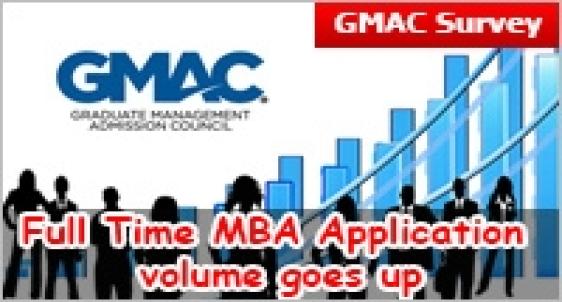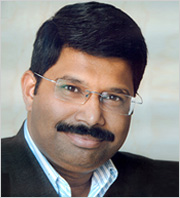
B-schools across the world see greater rise in volume of full time MBA applications in the year 2015 in comparison to past 2 years and as compared to a decade ago. Releasing the findings of 2015 Application Trends Survey in its report on Sep 23, 2015, the Graduate Management Admission Council (GMAC) data reveal that the majority of 2 year and 1 year full-time MBA programs have reported increase in application volume compared with last year and 10 years ago. A significant contribution to this rise in number of applications is from women candidates.
Among full-time 2 year MBA programs, 57 percent B-schools have reported increased application volume this year. For full-time 1 year MBA programs, 2015 marks a notable improvement as 51 percent of programs report application volume increase, compared with just 37 percent that reported growth last year. Both program formats are performing better compared with 10 years ago. 60 percent of full-time two-year and 53 percent of full-time one-year MBA programs indicate they received more applications this year than in 2005.
According to Bob Alig, GMAC’s executive vice president for school products “This is positive news and reflects a strong full-time MBA market. The full-time MBA continues to be a sought after credential because graduates consistently see a high return on their investment — not only in terms of earnings, but also in job satisfaction and personal fulfillment.”
MBA Application trends in Asia-pacific
For the Asia-Pacific region, full-time 2 year MBA programs are performing exceedingly well with 90% report increase in volume. 60% of full-time one-year MBA programs, on the other hand, report decrease in volume. These Asia-Pacific 2 year full time MBA programs are unique within the full-time MBA market as the majority of applicants are coming from within the region.
MBA Application trends in USA
The findings from GMAC’s 16th annual Application Trends Survey show a positive turnaround in the domestic market for U.S.-based, full-time 2 year MBA programs, as a majority (59 percent) report year-on-year domestic application growth — a level not attained since 2009. Domestic candidates still account for less than half of the applicant pool for these U.S. MBA programs — 45 percent in 2015.
This year’s report also reveals that the representation of women in program applicant pools has increased 3 to 8 percentage points over the last five years for all program types analyzed in the report, with the lone exception of Master of Accounting, which continues to maintain its majority level of female representation (57 percent). More than half of the following program formats report growing application volume for women in 2015: full-time two-year MBA (51 percent of programs), full-time one-year MBA (50 percent), executive MBA (50 percent), online MBA (55 percent), Master in Management (55 percent), Master of Finance (56 percent), and Master of Marketing and Communications (60 percent).
The report shows that targeted outreach for women candidates is conducted by 67 percent of full-time two-year MBA programs, 41 percent of part-time MBA programs, and 51 percent of executive MBA programs.
The majority of U.S.-based graduate management programs show stable or growing application volume from underrepresented populations. For example, 63 percent of full-time two-year MBA programs report stable (15 percent) or increasing (48 percent) application volume for this group.
MBA Application trends in Europe
European-based full-time one-year MBA programs rebounded in 2015 after two years of stagnant volume. The majority (67 percent) report year-on-year application volume growth, compared with 38 percent reporting the same the last two years. This uptick can be attributed largely to increased demand from international applicants (63 percent of programs report increase compared to last year).
Flexible MBA share going up
A greater share of online and flexible MBA programs report year-on-year application volume growth compared to part-time and executive MBA programs. This trend may be related to survey findings that indicate shifts in employer tuition assistance programs. This year, both part-time and executive MBA programs may expect fewer incoming students to have employer financial backing, whereas online MBA programs expect that a growing share of students will receive funding.
Specialized MBA share goes up
Specialized business masters programs report increase in application volume in Master in Finance; Master in Management and Master in Marketing and Communications programs. Among Master of Accounting programs, however, 40 percent report increase versus 47 percent reporting decrease.
Admission evaluation process
Full-time MBA programs cite the ability to collaborate as being very important; part-time MBA programs value work experience, while specialized business master’s programs look for academic and analytical skills.
In evaluating applicants, programs generally weigh academic transcripts, standardized exam scores, and interviews the most heavily in their admissions decisions.
Key Recruiting parameters
Survey respondents from all types of MBA program were asked to list 3 adjectives to describe who is the ideal business school candidate for recruitment. The frequently used words in responses included “motivated,” “driven,” “passionate,” and “ambitious.”
Data for the 2015 Application Trends Survey were collected from a total of 641 graduate business programs located at 306 universities worldwide.
Graduate Management Admission Council is a nonprofit education organization of leading graduate business schools and owner of the Graduate Management Admission Test (GMAT exam), now celebrating its 60th year and used by more than 6,000 graduate business and management programs worldwide. GMAC is based in Reston, Virginia, and has regional offices in London, New Delhi and Hong Kong. The GMAT exam is the standardized test designed expressly for graduate business and management programs worldwide. GMAT is continuously available at approximately 600 test centers in 113 countries.
Post your queries on GMAT scores of B-schools abroad on the forum at MBAUniverse.com
Related Article
GMAC Survey June 2015: MBA degree can double your salary; 89% value MBA degree as outstanding
GMAC holds its first annual conference in China
GMAC ties up with VIT Vellore to launch On Campus test centre
GMAT releases official updated study material; shares tips to ace the exam
Stay tuned to MBAUniverse.com for more updates on GMAT



























